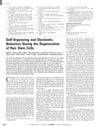 October 2024 in “Biology”
October 2024 in “Biology” Dermal papilla cells can help regrow hair and are promising for hair loss treatments.
 October 2024 in “Current Issues in Molecular Biology”
October 2024 in “Current Issues in Molecular Biology” Platycladus orientalis leaf extract helps hair grow by activating certain proteins.
 February 2024 in “International Journal of Molecular Sciences”
February 2024 in “International Journal of Molecular Sciences” Hair loss in Androgenetic Alopecia is caused by genetics, aging, and lifestyle, leading to hair follicle shrinkage and related health risks.
KRTAP6 genes affect wool quality in sheep.
 November 2023 in “Cell Proliferation”
November 2023 in “Cell Proliferation” A protein from fat-derived stem cells, DKK1, is linked to hair loss and blocking it may help treat alopecia areata.
 November 2023 in “The journal of investigative dermatology/Journal of investigative dermatology”
November 2023 in “The journal of investigative dermatology/Journal of investigative dermatology” Skin cells and certain hair follicle areas produce hemoglobin, which may help protect against oxidative stress like UV damage.
 August 2023 in “International Journal of Molecular Sciences”
August 2023 in “International Journal of Molecular Sciences” Human skin xenografting could improve our understanding of skin development, renewal, and healing.
 May 2022 in “Frontiers in Cell and Developmental Biology”
May 2022 in “Frontiers in Cell and Developmental Biology” miR-29a-5p prevents the formation of early hair structures by targeting a gene important for hair growth and is regulated by a complex network involving lncRNA627.1.
November 2022 in “Journal of Nanobiotechnology” The developed system could effectively treat hair loss and promote hair growth.
August 2022 in “Precision Clinical Medicine” JAM-A helps hair regrowth in alopecia areata by protecting VCAN in skin cells.
Sansevieria trifasciata Prain shows promise for treating hair loss by inhibiting androgen receptors.
January 2020 in “International Journal of Applied Biology and P” Finasteride treatment for three years changes certain polyamine levels in the blood but not in urine.
 52 citations,
March 2010 in “British Journal of Dermatology”
52 citations,
March 2010 in “British Journal of Dermatology” Alopecia areata shows a unique type 1 interferon signature, suggesting potential treatment by targeting this pathway.
 1160 citations,
November 2018 in “Physiological Reviews”
1160 citations,
November 2018 in “Physiological Reviews” The document concludes that better targeted treatments are needed for wound healing, and single-cell technologies may improve cell-based therapies.
 176 citations,
April 2011 in “Science”
176 citations,
April 2011 in “Science” Hair stem cell regeneration is controlled by signals that can explain different hair growth patterns and baldness.
 82 citations,
March 2016 in “Autoimmunity reviews”
82 citations,
March 2016 in “Autoimmunity reviews” Animal models have helped understand hair loss from alopecia areata and find new treatments.
8 citations,
May 2020 in “Arthritis research & therapy” DHT inhibition may increase spinal bone growth in ankylosing spondylitis.
 50 citations,
May 2004 in “Journal der Deutschen Dermatologischen Gesellschaft”
50 citations,
May 2004 in “Journal der Deutschen Dermatologischen Gesellschaft” Estrogens generally inhibit hair growth and improve skin quality, but their exact effects on hair follicles are complex and not fully understood.
 September 2023 in “medRxiv (Cold Spring Harbor Laboratory)”
September 2023 in “medRxiv (Cold Spring Harbor Laboratory)” Long-COVID has diverse, long-term health impacts, especially in young people.
 January 2024 in “Indian Journal of Pharmaceutical Sciences”
January 2024 in “Indian Journal of Pharmaceutical Sciences” Peach kernel extract may promote hair growth by boosting cell growth in hair follicles.
 1 citations,
December 2013 in “Turkderm”
1 citations,
December 2013 in “Turkderm” Use of cosmeceuticals during pregnancy and breastfeeding is not recommended due to insufficient safety data.
 7 citations,
June 2021 in “Trends in Food Science and Technology”
7 citations,
June 2021 in “Trends in Food Science and Technology” Western diet may cause male pattern baldness; low glycemic diet with magnesium could help.
 214 citations,
March 1993 in “Archives of Dermatology”
214 citations,
March 1993 in “Archives of Dermatology” Telogen effluvium is a reversible hair loss condition that requires a detailed diagnosis and often resolves on its own.
 162 citations,
August 2004 in “Journal of Investigative Dermatology”
162 citations,
August 2004 in “Journal of Investigative Dermatology” Hair loss causes stress and affects mental health; treatment and support needed.
161 citations,
June 1994 in “The journal of investigative dermatology/Journal of investigative dermatology” Hair stops producing melanin as it transitions from the growth phase to the resting phase.
154 citations,
October 1996 in “Proceedings of the National Academy of Sciences of the United States of America” Estrogen affects hair growth and skin cell multiplication.
 144 citations,
July 2002 in “Clinical and Experimental Dermatology”
144 citations,
July 2002 in “Clinical and Experimental Dermatology” Telogen effluvium is a common type of hair loss that can resolve on its own or become chronic, with treatment depending on early diagnosis.
 125 citations,
September 2001 in “The FASEB Journal”
125 citations,
September 2001 in “The FASEB Journal” Stress can cause hair loss by negatively affecting hair follicles and this effect might be reversed with specific treatments.
 113 citations,
November 2017 in “Scientific Reports”
113 citations,
November 2017 in “Scientific Reports” Tiny particles from stem cells help activate hair growth cells and encourage hair growth in mice without being toxic.
 86 citations,
May 2011 in “Journal of The American Academy of Dermatology”
86 citations,
May 2011 in “Journal of The American Academy of Dermatology” How bad a woman's hair loss is doesn't always match how it affects her happiness and daily life.






















